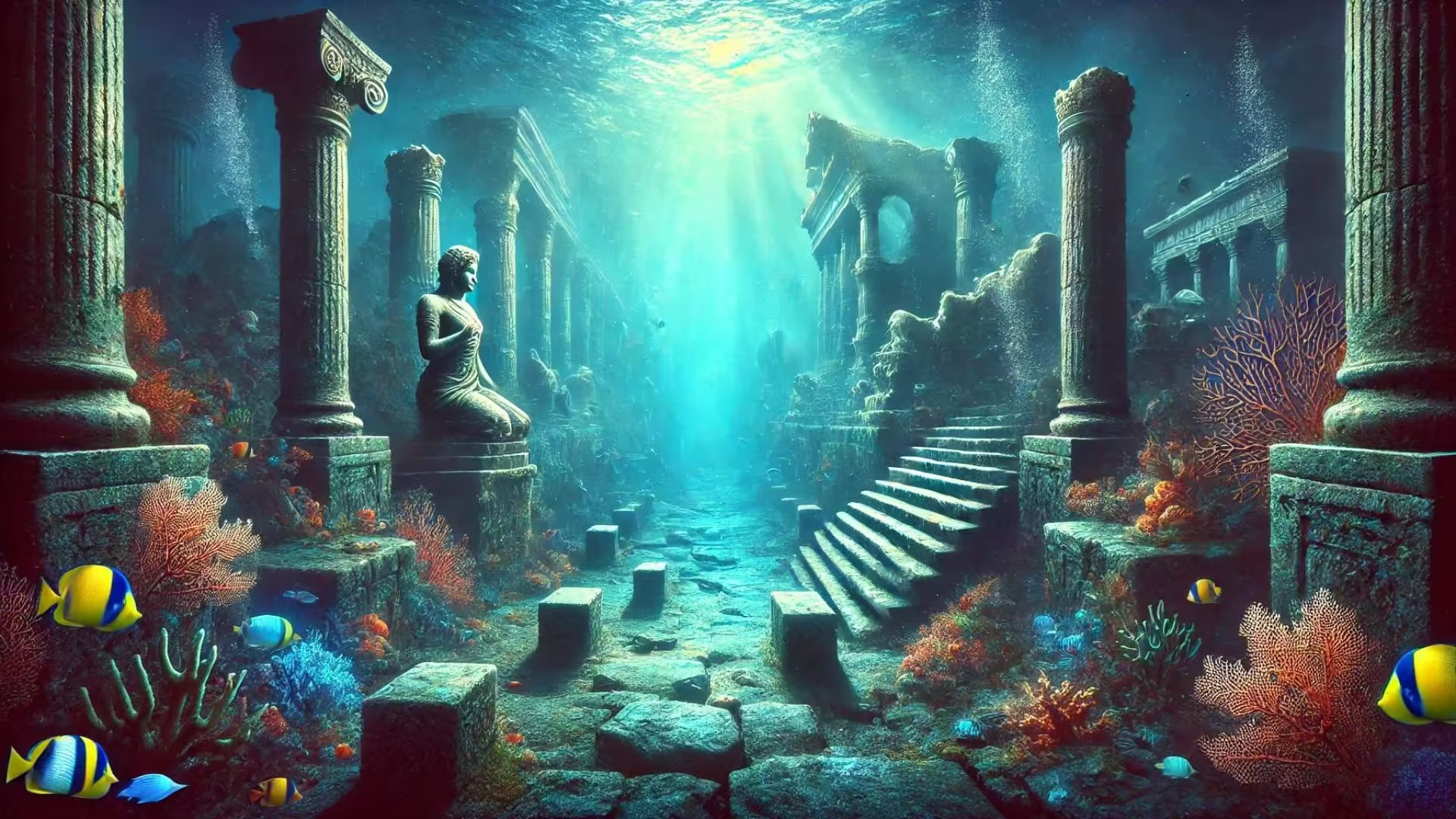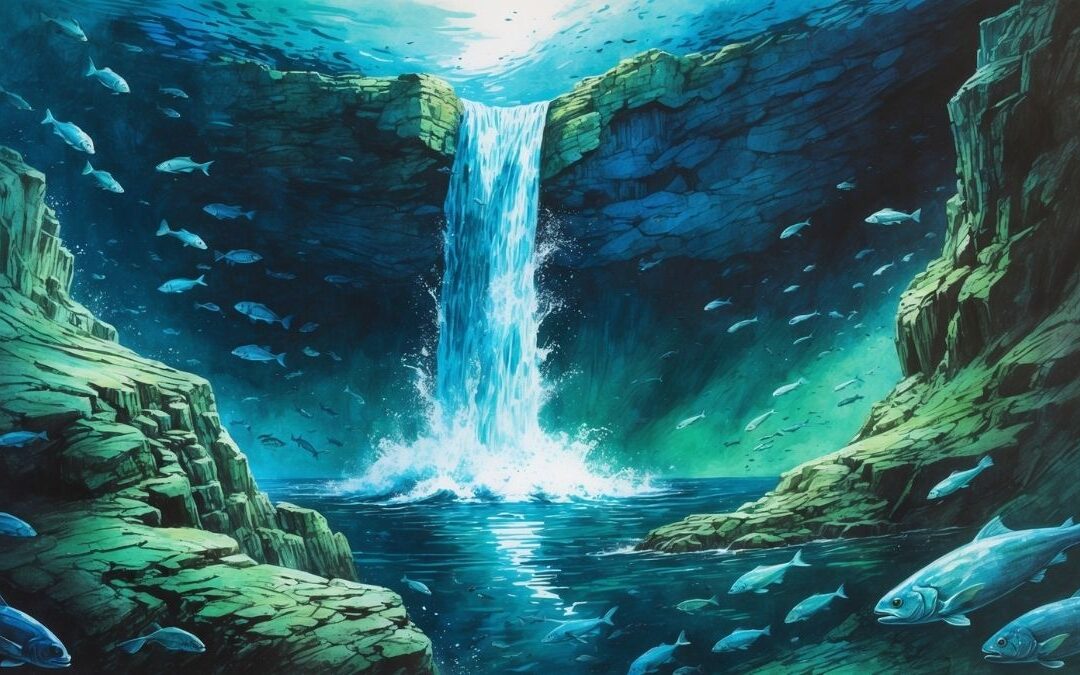The Gist
Unveiling the Mystery of the Lost City of Atlantis
The Lost City of Atlantis—just the name itself stirs the imagination. A grand, ancient civilization that rose to power and then disappeared beneath the waves in a single, catastrophic event. But is there any truth to the legend? Or is Atlantis just a cautionary tale from the ancient world?
The story of Atlantis comes to us primarily from the works of the Greek philosopher Plato, who mentioned the city in his dialogues Timaeus and Critias, written around 360 BC. According to Plato, Atlantis was a mighty empire situated beyond the “Pillars of Hercules” (thought to be the Strait of Gibraltar) that existed some 9,000 years before his time. Atlantis was described as a marvel of human achievement, with advanced technologies, impressive architecture, and a society of unparalleled wealth. However, due to the moral decay of its people, Atlantis was punished by the gods, sinking into the ocean in a single day and night.
But was Plato’s account a true historical record, or simply an allegory meant to illustrate the dangers of hubris and greed? This is where the mystery deepens, and countless theories arise.
Atlantis: Fact or Fiction?
One of the biggest debates around Atlantis is whether it was ever a real place or a product of Plato’s imagination. Some scholars believe that Plato used Atlantis as a literary device to teach lessons about morality and governance. In this view, Atlantis never existed beyond the pages of his works. Others, however, argue that there could be a kernel of truth in the tale, suggesting that Plato may have based his story on real events or places, perhaps an ancient city that met a tragic end.
One compelling theory is that Atlantis may have been inspired by the Minoan civilization, which thrived on the island of Crete until around 1600 BC. The Minoans were highly advanced, with impressive architecture and an extensive trade network. Their sudden downfall, likely due to a massive volcanic eruption on the nearby island of Thera (modern-day Santorini), may have sparked stories that eventually evolved into the myth of Atlantis.
The Search for Atlantis
Over the centuries, adventurers and explorers have scoured the globe in search of the fabled lost city. From the Mediterranean to the Caribbean, various locations have been proposed as the possible resting place of Atlantis. Some have suggested that it could be submerged off the coast of Spain, while others believe it lies in the depths of the Atlantic Ocean.
In more recent years, the use of advanced technology like satellite imagery and underwater archaeology has reignited the search for Atlantis. Some researchers claim to have found evidence of submerged cities that could be remnants of this lost civilization, though none have been definitively linked to Plato’s description.
Theories and Speculations
The lack of solid evidence has not stopped the flood of theories surrounding Atlantis. Some speculate that Atlantis was an alien civilization with technology far beyond anything humans could create. Others believe it could be an early story of a natural disaster, such as a tsunami or earthquake, passed down through oral traditions and later shaped into the legend we know today.
The fascination with Atlantis is not just about finding physical evidence. The city has become a symbol of lost knowledge, a utopia destroyed by its own arrogance. In many ways, it represents humanity’s fear of self-destruction—our ability to create greatness and our equal ability to ruin it.
Atlantis in Popular Culture
From novels to movies to video games, the story of Atlantis continues to thrive in popular culture. It has been depicted as everything from a futuristic metropolis to an underwater kingdom ruled by mystical beings. Atlantis captures the imagination because it plays on our desire to uncover lost secrets and civilizations.
But beyond the fantasy, the legend of Atlantis asks important questions. What happens when a society grows too powerful? What are the consequences of moral and environmental collapse? These themes are just as relevant today as they were in Plato’s time, which may explain why Atlantis continues to captivate us.
The Enduring Mystery
The Lost City of Atlantis may never be found, but its story will likely endure for generations to come. Whether it was a real place or merely a myth, Atlantis represents more than just a sunken city. It’s a reflection of our own hopes and fears, our triumphs and failures. The search for Atlantis is really a search for ourselves—what we value, what we fear losing, and how we strive to understand the world around us.
Now that you’ve explored the mystery of Atlantis, think about how legends and myths shape the way we view history. What other ancient stories might contain hidden truths, waiting to be uncovered? Dive into history and keep your curiosity alive—it’s through questions like these that we keep the spirit of discovery going!
Let’s Talk
Let’s talk about Atlantis. I mean, how can you not be fascinated by the idea of an entire civilization just disappearing overnight? It’s like the ultimate unsolved mystery. But have you ever thought about why we’re so obsessed with this story? I get it—there’s something thrilling about the unknown, the possibility that there’s more out there beneath the ocean than we could ever imagine. But maybe the bigger question is, what does this story tell us about ourselves?
Think about it for a second. Atlantis was supposedly this utopian society, way ahead of its time, full of advanced technology and riches. But then, bam—it’s all wiped out because, according to Plato, they got a little too full of themselves. It’s almost like a warning: don’t let power go to your head, or Mother Nature will show you who’s boss. Ever feel like that’s still relevant today? We build these massive cities, push the boundaries of technology, and sometimes forget that nature has its own plans. Atlantis could easily be seen as a metaphor for that—how we’re always balancing on that fine line between progress and destruction.
Speaking of metaphors, did you notice how Atlantis kind of reflects our modern fears? We’re constantly worried about the next big disaster—whether it’s climate change, a natural catastrophe, or even just societal collapse. It’s like we’ve been telling the Atlantis story in different forms for centuries. Whether it’s a sunken city or a dystopian future, we’re always trying to warn ourselves about the dangers of going too far. It makes you wonder: are we just drawn to these kinds of stories because they remind us of our own vulnerabilities?
And let’s not forget the search for Atlantis itself. I mean, isn’t it crazy how people are still out there, scanning the ocean floor, convinced that they might stumble upon the ruins of this mythical city? It’s like our version of treasure hunting. But here’s the thing—what if Atlantis never existed? What if we’re just chasing an idea, a symbol of lost knowledge? Maybe the real treasure isn’t the city itself but what it represents: the human drive to explore, to discover, to seek answers even when they’re hidden under miles of ocean.
Now, here’s where it gets personal. Have you ever had your own “Atlantis” moment? You know, that thing you’ve been chasing for a long time, whether it’s a goal, a dream, or even just an answer to a nagging question? We all have our own versions of a lost city—something elusive that we’re drawn to, even if we’re not sure it’s out there. Sometimes, the search itself teaches us more than the actual discovery ever could. Maybe that’s what the Atlantis myth is really about: the journey, the questions, and the thrill of not knowing.
So, here’s something to think about. If Atlantis represents the fear of losing something great, what’s your “Atlantis” in today’s world? Is it the fear of losing touch with nature? Or maybe the fear of technology outpacing humanity? And more importantly, how do we find balance so we don’t end up like the people of Atlantis, lost to history? There’s a lot to unpack there, and it’s something worth reflecting on as we navigate our own challenges and mysteries today.
Let’s Learn Vocabulary in Context
Let’s break down some of the key words and phrases we came across while talking about the mystery of Atlantis. The first one that stands out is utopian society. In the context of Atlantis, it’s used to describe this ideal, perfect civilization, one that seems almost too good to be true. In real life, we throw around the term “utopian” to describe something that’s perfect, but usually in an unrealistic or overly idealistic way. For example, you might hear someone say, “In a utopian world, we’d all have free healthcare and endless vacation days.” It’s the dream, right? But we all know perfection is hard to come by.
Another interesting term is catastrophic event. Atlantis supposedly disappeared after a catastrophic event—a sudden disaster that wiped it out. You can think of this word as describing any big, devastating occurrence, whether it’s a natural disaster like a tsunami or something more personal, like the time your phone fell into the pool. You could say, “Spilling coffee on my laptop was a catastrophic event,” because, well, that would feel like the end of the world in that moment, wouldn’t it?
Now, let’s talk about hubris, which is such a cool word. It refers to excessive pride or self-confidence, and in the story of Atlantis, it’s what caused the downfall of this great civilization. You might not use hubris every day, but it’s a great way to describe someone who’s a little too cocky for their own good. For example, “His hubris made him think he didn’t need to study for the exam, and well, we all know how that turned out.” It’s a perfect word for when someone’s overconfidence leads them to failure.
We also mentioned advanced civilization, which describes societies that are highly developed in terms of culture, technology, or governance. In the context of Atlantis, it’s used to highlight how this mysterious city was supposedly way ahead of its time. You might use this phrase in everyday conversation when talking about ancient empires or even modern tech-driven societies. “We live in such an advanced civilization now, with all these crazy technologies, but sometimes I wonder if we’re losing touch with the simple things.”
Lastly, we’ve got metaphor, which we used when discussing how Atlantis could be seen as a metaphor for our own fears and anxieties. A metaphor is when you describe something by comparing it to something else, often to make a point or create a clearer image. In everyday life, we use metaphors all the time without even thinking about it. Like when you say, “Life is a rollercoaster,” you’re not talking about an actual amusement park ride, but you’re using that image to express how life has its ups and downs.
To wrap this up, here are a couple of questions to get you thinking: Do you think the concept of a utopian society is possible, or is it always just out of reach? And how does hubris play a role in modern-day societies, just as it supposedly did in Atlantis? Let’s think about how these ideas fit into our world today.










0 Comments